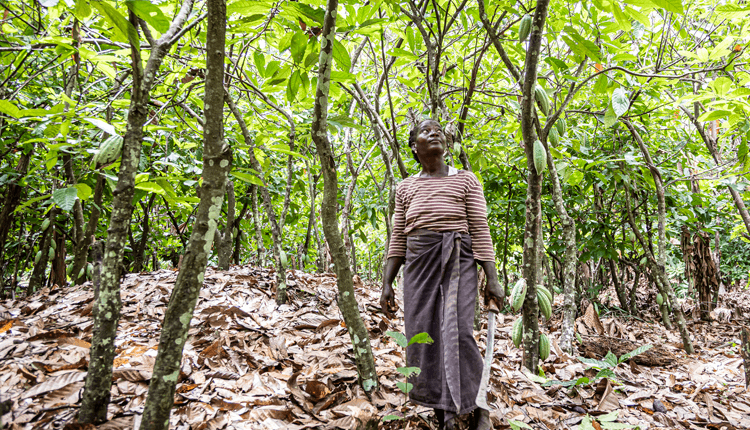Cocoa Land Lease Agreement Hoped To Enhance Ghana’s Production
Agreement frees up 614,000 hectares of smallholder cocoa farms for rehabilitation
A landmark agreement on land-lease in Ghana’s leading cocoa producing hub is praised as significant in increasing national production output.
A protracted land dispute had meant about 614,000 hectares of smallholder cocoa farms lacked maintenance, particularly the government-backed cocoa farm rehabilitation programme.
Sefwi Wiawso, the community at the centre of the development, is credited with about 50 per cent of the West African country’s cocoa production volumes.
Solidaridad West Africa facilitated the stakeholder negotiation that made changes to land tenure arrangement to support better cocoa farming practices under its Advocacy for Change for Sustainable Cocoa Landscapes initiative.
The new wind of change in Sefwi Wiawso in the Western North region of Ghana comes as a great relief for smallholder tenant farmers, bringing an amicable resolution of a decade-long land-lease dispute with traditional landowners.
Stakeholders gathered for Ghana’s first-ever Round Table on Sustainable Cocoa
“We lived in fear of losing our cocoa farms because of the unfavourable conditions in the initial lease agreement proposed by the landowners,” says Nana Kwadwo Agyei, president of the Smallholder Tenant Farmers’ Association in Sefwi Wiawso.
Chairman of the Land Committee of the Sefwi Wiawso Traditional Council, Nana Kwao Asante Bediatuo, commented that the negotiations have mended the strained relationship that existed between them and the farmers.
After years of contestations, we have finally agreed to a 50-year occupancy period subject to automatic renewal under terms that favour both sides.” -Nana Kwao Asante Bediatuo
Land Ownership
The customary land tenure arrangement is a common landholding system in most rural areas in Ghana.
Customary lands are managed and allocated by traditional or customary leaders such as chiefs, clan heads or family heads.
The arrangement is characterized by oral agreements between the landowner and the prospective tenant farmer, with little consideration for documentation.
The lack of a written agreement as proof of ownership usually weakens the rights of farmers to lay claim to their farmlands when conflicts arise.
When farmers do not have secured ownership rights to their farmlands, they show no interest in making long-term investments to rehabilitate old and diseased cocoa farms or engage in sustainable land-use practices like maintaining trees on-farm.
This has the potential to affect Ghana’s future cocoa production volumes.
Advocacy For Change
To improve the land tenure and ownership security issues in the Sefwi Wiawso traditional area, Solidaridad, through the Advocacy for Change for Sustainable Cocoa Landscapes project, organized and facilitated negotiation meetings, which included the first-ever roundtable, to bring consensus.
The discussions included the tenant farmer groups, landowners, representatives from the Ghana Cocoa Board, Lands Commission, Forestry Commission, Office of the Administrator of Stool Lands, and other civil society organizations.
Prior to the negotiations, the tenant farmers and the landowners received training on advocacy, Ghana’s land policy, governance and tenure security to deepen their understanding of land documentation processes.
The project also provided legal and technical support to ensure that the provisions discussed during negotiations were within the legal framework that regulates land use in Ghana.
For the smallholder tenant farmers, the new agreement affords them the opportunity to farm without the fear of losing their farmlands.
“We are activated to rehabilitate our cocoa farms, thanks to the new agreement. We are happy that now our relationship with the landowners has improved due to this Solidaridad intervention,” says Nana Kwadwo Agyei.
A Collaborative Approach
Participants were trained in advocacy and negotiation skills before the convening
Advocacy for Change for Sustainable Cocoa Landscapes is a four-year Dutch government-funded project implemented by Solidaridad in Ghana since 2016.
The project focuses on enhancing standards to support the adoption of sustainable-driven interventions in the Ghanaian cocoa landscape.
This is done by engaging decision-makers, government agencies, civil society organizations and the private sector to formulate and implement policy reforms on land and tree ownership security to enhance long-term investments in sustainable land-use practices.
As an outcome, Solidaridad has advocated policy recommendations that completely devolve on-farm planted trees and naturally occurring tree ownership to farmers through multi-sectoral national platforms.
- Major Ghana Cocoa Region 81% Infected with Bean Disease - July 22, 2024
- Ghana to Delay More Cocoa Deliveries as Supply Crisis Worsens - June 12, 2024
- Cocoa Production Helping Mitigate Climate Change Impact - June 10, 2024
